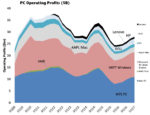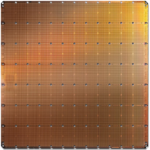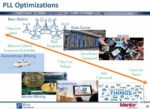Designers spend plenty of time analyzing the effects of process, voltage and temperature. But everyone knows it’s not enough to simply stop there. Operating environments are tough and have lots of limitations, especially when it comes to power consumption and thermal issues. Thermal protection and even over-voltage protections… Read More
Semiconductor Intellectual Property
PCI Express in Depth – Transaction Layer
In the last article i write about the Data Link Layer, in this article i’ll write about the Transaction Layer.
This layer’s primary responsibility is to create PCI Express request and completion transactions. It has both transmit functions for outgoing transactions, and receive functions for incoming transactions.… Read More
PCI Express in Depth – Data Link Layer
In the last article, i wrote about the physical layer, now let’s take a look in the next layer the data link layer.
The Data Link Layer serves as the “gatekeeper” for each individual link within a PCI Express system. It ensures that the data being sent back and forth across the link is correct and received in the same order it
How an Nvidia/ARM deal could create the dominant ecosystem for the next computer era
Over the past few weeks, there have been numerous reports about Nvidia’s overtures to acquire Arm. The news has mostly been obsessed about the $31 billion that Arm’s current owner, Softbank, paid for Arm and whether Nvidia could pay such an eye-watering price to buy this asset. There is also pushback from Herman Hauser who was one… Read More
Cerebras and Analog Bits at TSMC OIP – Collaboration on the Largest and Most Powerful AI Chip in the World
This is another installment covering TSMC’s very popular Open Innovation Platform event (OIP), held on August 25. This event presents a diverse and high-impact series of presentations describing how TSMC’s vast ecosystem collaborates with each other and with TSMC. The topic at hand was full of superlatives, which isn’t surprising… Read More
Lip-Bu Hyperscaler Cast Kicks off CadenceLIVE
Lip-Bu (Cadence CEO) sure knows how to draw a crowd. For the opening keynote in CadenceLIVE (Americas) this year, he reprised his data-centric revolution pitch, followed by a talk from a VP at AWS on bending the curve in chip development. And that was followed by a talk by a Facebook director of strategy and technology on aspects of… Read More
WEBINAR: Addressing Verification Challenges in the Development of Optimized SRAM Solutions with surecore and Mentor Solido
After spending a significant amount of my career in the IP library business it was an easy transition to Solido Design. I spent 10+ years traveling the world with CEO Amit Gupta working with the foundries and their top customers. In fact, the top 40 semiconductor companies use Solido. IP companies are also big Solido users including… Read More
Creating Analog PLL IP for TSMC 5nm and 3nm
TSMC’s Open Innovation Platform’s main objective is to create and promote partnership for producing chips. This year’s OIP event included a presentation on the joint efforts of Silicon Creations, Mentor, a Siemens business and TSMC to produce essential PLL IP for 5nm and 3nm designs. The relentless push for smaller geometries… Read More
Protocol in Depth – USB
The USB protocol is a very complex protocol, so there is no way i can explain every detail in a post, but i can let much more easy to understand what happens in a bit level.
There isn’t much good material for easy understand about USB, so i made some assumptions for make easier explain everything. In this post i’ll explain… Read More
Making Full Memory IP Robust During Design
Looking at a typical SoC design today it’s likely to contain a massive amount of memory IP, like: RAM, ROM, register files. Keeping memory close to the CPU makes sense for the lowest latency and highest performance metrics, but what about process variations affecting the memory operation? At the recent DAC conference held… Read More











AI Bubble?